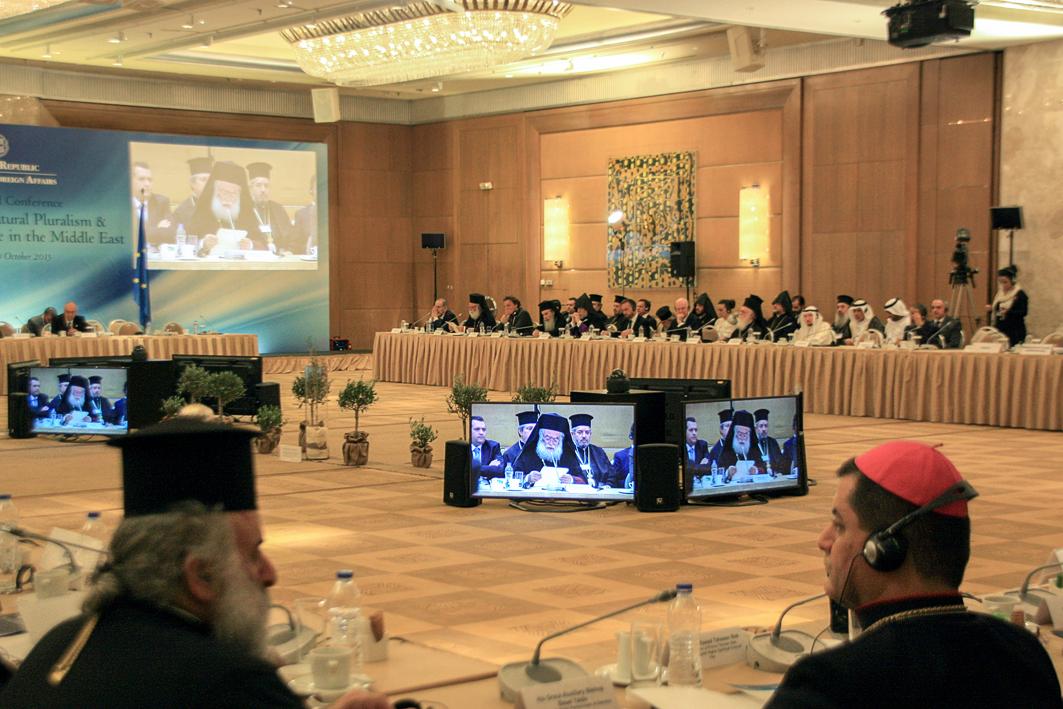*By Nikos Kosmidis
An international conference held at the invitation of the Foreign Minister of the Hellenic Republic, Nikos Kotzias, has gathered around 70 prominent religious, political and academic figures in Athens, Greece, this week.
From 18 to 20 October 2015, patriarchs, primates and leaders of Christian churches in the Middle East and beyond, as well as leaders of the Muslim and Jewish communities of the region, representatives drawn from international politics, academics, intellectuals and members of civil society met together in a spirit of interreligious understanding and mutual respect.
The delegations addressed the challenging issues of the escalating violence in Middle East, the persecution of religious minorities, the refugee and humanitarian crisis, the destruction of valuable cultural legacies of global significance and the responsibility of the international community for the protection of human rights.
Under the theme “Religious and Cultural Pluralism and Peaceful Coexistence in the Middle East”, participants shared their experiences from the long multireligious and multicultural tradition in the region while emphasizing the moral, spiritual and scriptural elements of the three monotheistic religions that shape believers’ respect for religious and cultural diversity. The representatives of the different delegations underlined once again that violence in the name of God and religion is an offence against God, while there is a strong need to understand all the political, economic, ideological and even religious causes that are responsible for the development and strengthening of religious extremism and fundamentalism.
Among other painful stories from the Middle East and Africa, delegates from Syria and Iraq shared their stories of ongoing suffering, tragedy and trauma in the collective memory which cause obstacles for reconciliation between the different ethnic and religious communities, particularly between majority and minority groups. Archbishop Mor Nicodemus Daoud Sharaf of Mosul and Environs, described the attacks against his church in Mosul in which former neighbours, and people who received his pastoral assistance in the past, participated as well. He expressed his struggle to find the courage to re-envision a future of peaceful coexistence.
Christians, Yazidis, Shabaaks and others, including Muslims, experience persecution under the attacks of ISIS. Participants agreed that it is crucial for the different religious communities to strive together for the healing of deep wounds caused by the ongoing violence.
Archbishop Anastasios of Tirana and All Albania, a former World Council of Churches (WCC) president, underlined in his address the common elements of the Abrahamic faiths, meaning the “search for inner peace, the curbing of aggression, principles that facilitate peaceful co-existence within each particular social group, peaceful relations with the supreme Reality, with a Personal God and the desire to maintain peace with all humankind.” He encouraged all religious ministers to “cultivate a peaceful theology and anthropology” based on the rich tradition of their own faith. In addition, he reminded his listeners that peace is achievable only through justice, and thus the political and religious world leaders are responsible to address effectively all the different situations of injustice.
According to Pope and Patriarch of Alexandria and All Africa Theodoros II, Europe has a “historic duty to assist in Africa and the Middle East to overcome the incompatibility between North and South of the Mediterranean Sea and to promote the values of civil society.” He noted that it is on the grounds of poverty that fundamentalism and intolerance flourish.
The general secretary of the WCC, Rev. Dr Olav Fykse Tveit, highlighted the role of the international community in protecting the diversity within the different societies in the Middle East as well as the dignity, freedom, justice, participation in the public sphere and equal rights of all citizens regardless of their religious or other conviction. This necessity should be carried out not “by military actions and interventions, but rather through peace processes which should be inclusive in nature. They should lead to the building of new social and political foundations that respond to the new aspirations of the younger generation”.
In his remarks, the hosting Greek foreign minister, Kotzias, expressed his deep appreciation for the contribution of all the participants and the commonly agreed values of peaceful coexistence of different faiths and convictions, as against efforts to impose one view over another. For Kotzias, those who exercise religious violence “consider themselves to be the exclusive messenger of God to humankind; unique and with the right to decide who lives and who dies”. So, it is of major importance to protect the human and social rights of those who suffer persecution and to secure their choice “to remain at the hearths of their culture, to choose the doctrine and current of faith they desire”. He also underlined the need for European Union and the West to take sufficient steps to protect culture and religious plurality. Finally, he reconfirmed the will of Greece to contribute in this direction through a multidimensional foreign policy, support of interreligious and intercultural dialogue and the creation of an Observatory for the situation in the Middle East.
*Nikos Kosmidis is a freelancer in Greece, and a former intern at the WCC Communications.
Statement of the Presidium of the Athens International Conference







